If you are looking for the perfect family dog, then look no further than the golden retriever! This breed is known for being one of the most friendly and tolerable pups around, making them a wonderful addition to any family home. Not only are they some of the best companions you could ever ask for, but they are also intelligent enough to fill important service roles. Golden retrievers have been known to work in spaces ranging from search and rescue to medical service, and they complete these important jobs with pride! If you’re interested in these popular dogs, you’ll need to understand all about golden retriever progression.
With how wonderful of a pup the golden retriever is, many dog lovers have their eyes set on this canine friend. We want you to have the tools needed to be the best golden retriever parent possible, so let’s dive into everything you need to know about their care! We’ll discuss their growth chart, dietary recommendations, behavior, and so much more!
Let’s get started!
Brief Golden Retriever Summary
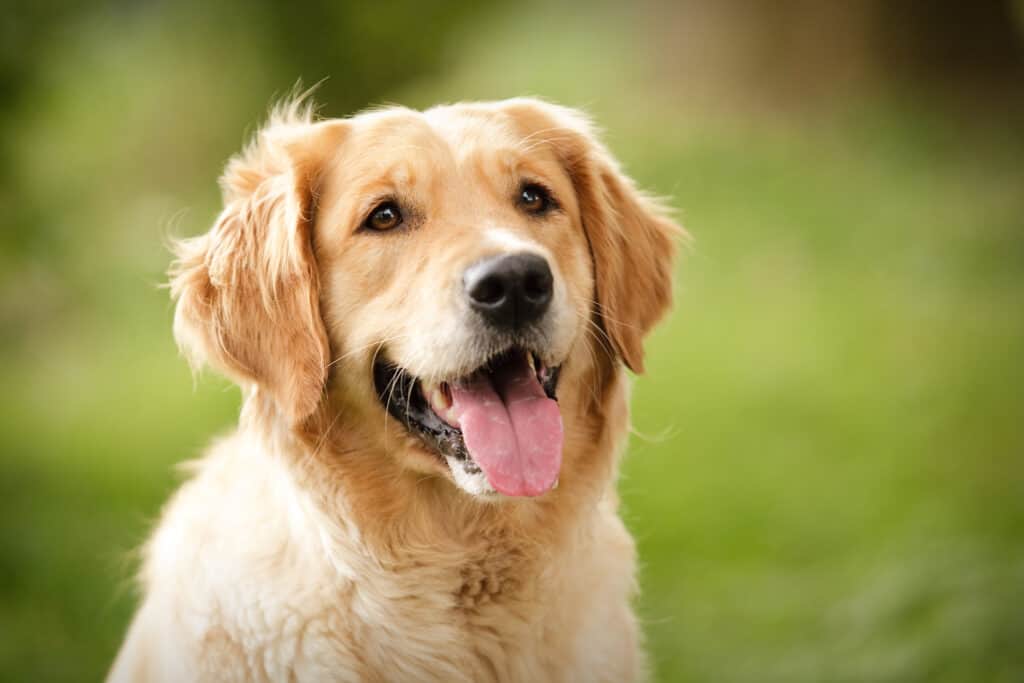
The golden retriever is intelligent and easily trained.
©Joop Snijder Photography/Shutterstock.com
The golden retriever has ranked at the top of the ‘most popular U.S. dog breeds’ list for years. They were originally bred to accompany their owners on hunts and retrieve ducks in the water, but their fierce loyalty and kind nature was impossible to ignore. It didn’t take long for the golden retriever to become one of the most well-known family dogs around, and for dog lovers around the globe to fall in love with this stunning pup.
In addition to being incredibly loving and gentle, the golden retriever is intelligent and easily trained. This is why the breed is well-known in the service arena and has found themselves in a variety of important work roles. Golden retrievers are known to be service animals, police K9s, search and rescue dogs, and more.
Overall, the golden retriever is a one of a kind pup that has a long list of great qualities! It’s no wonder this canine friend is so popular around the globe.
Golden Retriever Growth and Weight Chart by Age
If you have just welcomed a golden retriever puppy into your family, then you will want to know what to expect as they grow each month. Every golden retriever will vary based on their genetics, but we can offer you an idea of what to expect!
| Age | Male Weight | Female Weight |
|---|---|---|
| Birth | About 1 pound | About 1 pound |
| 1 Month | 3-5 pounds | 2-5 pounds |
| 6 Weeks | 4-8 pounds | 3-5 pounds |
| 2 Months | 8-15 pounds | 5-10 pounds |
| 3 Months | 20-25 pounds | 15-20 pounds |
| 4 Months | 25-30 pounds | 20-25 pounds |
| 5 Months | 35-40 pounds | 25-30 pounds |
| 6 Months | 35-45 pounds | 30-35 pounds |
| 7 Months | 40-50 pounds | 30-40 pounds |
| 8 Months | 45-55 pounds | 35-45 pounds |
| 9 Months | 50-60 pounds | 40-50 pounds |
| 10 Months | 55-65 pounds | 45-55 pounds |
| 11 Months | 60-70 pounds | 50-55 pounds |
| 12 Months | 60-70 pounds | 50-60 pounds |
| 2 Years | 60-75 pounds | 50-65 pounds |
As we mentioned above, every golden retriever will vary in size based on the adult size of their parents. The best way to estimate your pup’s eventual size is by meeting their parents in person!
When Will My Golden Retriever Stop Growing?
Your golden retriever will grow quickly throughout their first year of life, so you may wonder just how long their growth spurts will last. Most golden retrievers will reach their ultimate height by the time they reach 12 months of age, but your golden pup may continue to fill out until they are 18 months old.
Once your golden retriever has reached 18 months of age, it’s typically safe to say they have reached their true adult size. Just keep in mind that some dogs will put on additional weight based on their diet and daily activity levels.
How Big Will My Golden Retriever Be When It’s Fully Grown?

Most golden retrievers will weight anywhere between 50 to 75 pounds.
©iStock.com/Irina Kashaeva
As we discussed above, most golden retrievers will reach their mature size by the time they are 18 months old. Though male and female golden retrievers may vary slightly in size, you can typically expect your canine friend to weigh anywhere from 50-75 pounds once they reach adulthood.
Not all golden retrievers fall in this standard weight range, so we always suggest referring to your dog’s parents to get a better idea of how big they will be when they are fully grown!
The Biggest Golden Retriever Ever Recorded
Most golden retrievers will not exceed 75 pounds, but there will always be a few canine friends that set their own record! A golden retriever named Kai appears to have been the biggest golden recorded, as he weighed in at a whopping 173 pounds when he was first adopted. However, this extra weight was not due to being naturally large in size, but instead was due to being dangerously overweight.
Kai was originally surrender due to being obese and struggling with his mobility, but he was soon taken in by a rescue that was dedicated to helping him on his weight loss journey. In just over a year after being surrendered to a loving rescue, Kai lost an impressive 100 pounds. Kai is no longer the biggest golden retriever ever recorded, but he is now living his best life!
When Should My Golden Retriever Stop Eating Puppy Food?
If you have a golden retriever puppy in your home, then you should always feed them a high-quality puppy diet until they have reached maturity. Puppy food contains vital nutrients that a puppy needs to thrive, and it is also jam packed with the extra calories needed to keep up with their daily energy requirements.
While many pet parents are ready and willing to offer their growing pups a puppy specific diet, many are unaware of when it is time to switch over to an adult kibble. Though every dog breed is different, you can typically transition your golden retriever over to a diet made for adult dogs once they have reached 12 months of age. Your Golden may continue to fill out in the six to 12 months to follow, but they have completed the majority of their growth by the one-year mark.
When Will My Golden Retriever Start Losing Teeth?
Did you know that all dogs will lose a set of baby teeth just like you and I do throughout our childhood? This process may occur over a period of months instead of years, but they will still lose a set of baby teeth to make room for their permanent adult teeth!
Once a golden retriever puppy reaches three to four weeks of age, they will start to grow the sharp baby teeth that will often chew on your fingers. They will keep these baby teeth until they reach 12 weeks of age, and they will then begin to grow in their permanent adult teeth. Their permanent teeth will continue to erupt over the span of six months, and you will notice their baby teeth fall out throughout this process. Once your Golden Retriever is six months old, they should have a full set of permanent teeth.
When Should I Start Training My Golden Retriever?
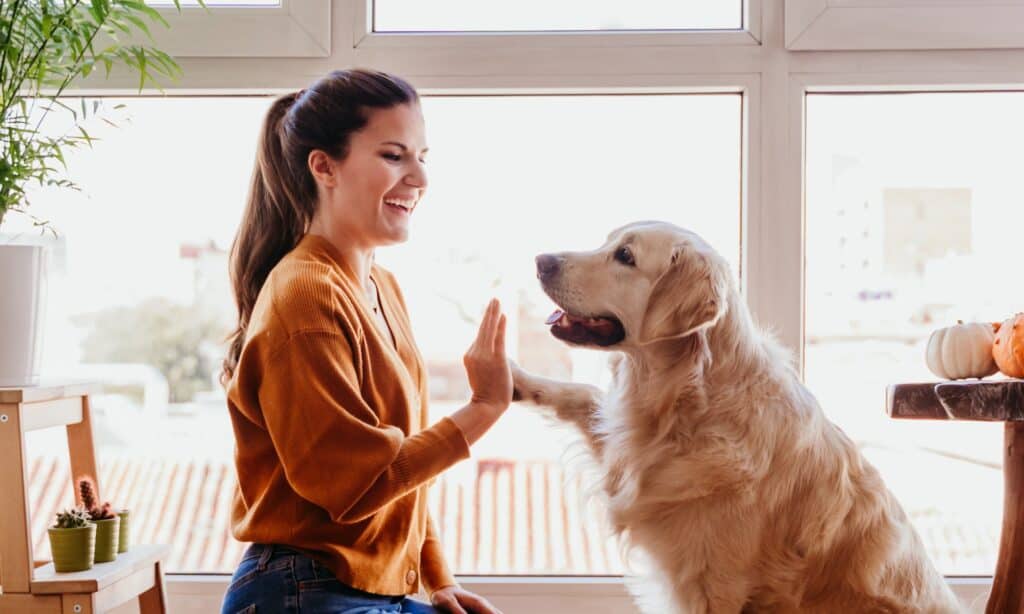
Most golden retrievers can begin their obedience training at eight weeks of age.
©iStock.com/Eva Blanco
The golden retriever is known for being one of the most tolerable and kind-natured pups around, but that does not mean they can surpass obedience training. In order to help your beloved golden become the well-rounded pup you want in your family, they will need to undergo basic obedience training from the time they enter your home.
In order to instill structure that paves the way for a well-behaved adult golden retriever, we always suggest that you start to train your canine friend from the moment you adopt them. Whether they are six weeks old or six months old when they enter your home, it’s time to dive into their obedience training!
In addition to basic obedience training, we also strongly suggest socializing your golden retriever as early on as possible. Golden retrievers are known for being incredibly friendly, but any pup can struggle in unfamiliar settings if they have not been exposed to anything outside of their home. Proper socialization for the golden retriever would involve introducing your pup to unfamiliar humans, animals outside of your home, new settings, and new sounds.
Just remember that you should not allow your puppy to interact with unfamiliar, or unvaccinated dogs until they have received three doses of their parvo and distemper vaccines. Your beloved golden will not be fully protected against these illnesses until they have completed their puppy vaccination series.
What Commands Should I Teach My Golden Retriever First?
If you are beginning your golden retriever’s training journey, you may wonder which tricks you should start with first. Though every dog is different, there are a few commands that we think all family pups should learn!
- Sit
- Stay
- Lay down
- Come
- Drop it
Not only are the above commands important for your golden retriever to learn, but socialization should be at the top of the list! We want you to have a trustworthy dog in any setting, so we suggest introducing your golden retriever to new things from the moment you adopt them, and to other animals from the time they are fully vaccinated.
When Should My Golden Retriever Be Housebroken?
Welcoming a golden retriever puppy into your family is a joyous time, but there is no denying how frustrating potty training can be. If you are just beginning the potty training journey with your golden retriever, you may wonder just how long of a road you have ahead.
Every dog will vary on how quickly they pick up on house training, but most golden retrievers will be completely housebroken within three to five months of their potty training being put into place. Some canine friends will catch on sooner than others, but due to how smart the golden retriever is, most are housebroken within a few months!
When Should I Spay Or Neuter My Golden Retriever?
You may be researching the process of spaying or neutering your pup. Sterilizing your canine friend has a variety of health benefits, ranging from preventing unwanted litters to preventing dangerous reproductive cancers. You probably want to know the best time to offer it to your beloved golden.
This is still a debated topic in the pet health space. However, most veterinary experts agree that sterilizing your pup between the age of six months to one year is best. This appears to be the sweet spot. It prevents complications that come along with sterilizing too young. At the same time, it is still early enough to prevent many undesirable behaviors that are driven by hormones.
Just remember that your vet is the only one that knows the details of your pet’s health status and needs. We always suggest asking your vet what age range she suggests for sterilization.
When Should My Golden Retriever Calm Down?
Playfulness is one of the golden retriever’s best qualities, especially if you have a home with children or other energetic pups. Though this is a great perk for a family dog to have, you may wonder just how long you can expect your pup to be bouncing off the walls with energy.
Every golden retriever is different, but most of them will start to calm down by the time they reach four years of age. They should still be interested in engaging in their favorite activities at this point, but they may simply be more interested in mid-day naps and enjoying lazy time with the owners they love.
Common Health Issues Your Golden Retriever May Experience
Your golden retriever will likely live a long and healthy life. But there are a few health complications you should be on the lookout for. The golden retriever has a few health issues they are more at risk of developing than other dogs.
Let’s discuss some of the most common health issues seen in golden retrievers.
Joint Disease
Golden retrievers are more prone to developing different forms of joint disease. This can include complications like elbow dysplasia, hip dysplasia, and the development of arthritis in these areas as a result. Some of the potential signs of joint disease include stiff joints, limping, and difficulty getting up and down. They may also show disinterest in physical activity, muscle wasting in the back end, a change in their normal gait, and even swollen joints.
Allergies
Golden retrievers are known to experience allergies, especially those involving their skin. Allergies to plant material are most common, but they can develop sensitives to anything in the world around them. Some symptoms of allergies include red skin, constant itching, fur loss, dry skin, skin sores, skin odor, and ear infections.
Ear Infection
Goldens have an increased risk of skin allergies and very fluffy ears. This means they have an increased risk of developing ear infections. Some common signs of a painful ear infection include frequent head shaking, pawing at the ears, and rubbing their face on the ground. You may also notice ear odor, ear discharge, ear crusting, and pain when their ears are touched.
Heart Disease
Golden retrievers have an increased risk of developing heart disease. This is due to cardiac abnormalities that are commonly seen in the breed. This is most often seen in golden retrievers over the age of five, but it can impact any age. Some of the potential symptoms include coughing, weakness, exercise intolerance, and labored breathing. Abdominal swelling may occur in the later stages of the disease.
Cancer
Unfortunately, cancer is more commonly seen in golden retrievers than many other dog breeds. Hemangiosarcoma appears to be the most common cancer seen in goldens. However, they can fall victim to a variety of life-altering cancers.
Pictures Of the Golden Retriever as a Puppy
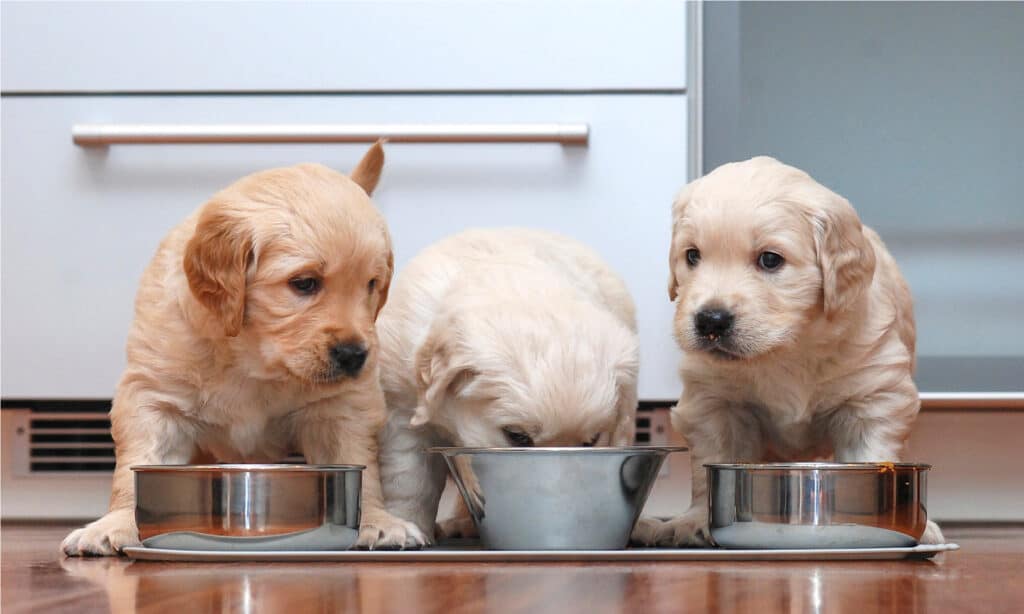
Golden retriever puppies certainly enjoy a good meal!
©/Shutterstock.com
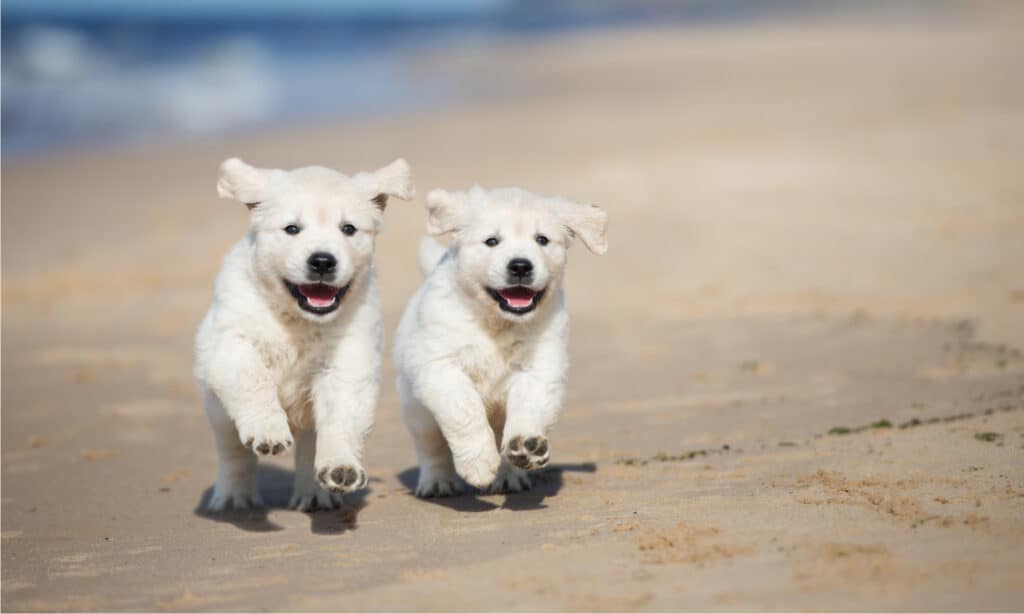
Golden retriever puppies have a lot of energy, like these two running on the beach.
©otsphoto/Shutterstock.com
Pictures Of the Golden Retriever At 6 Months
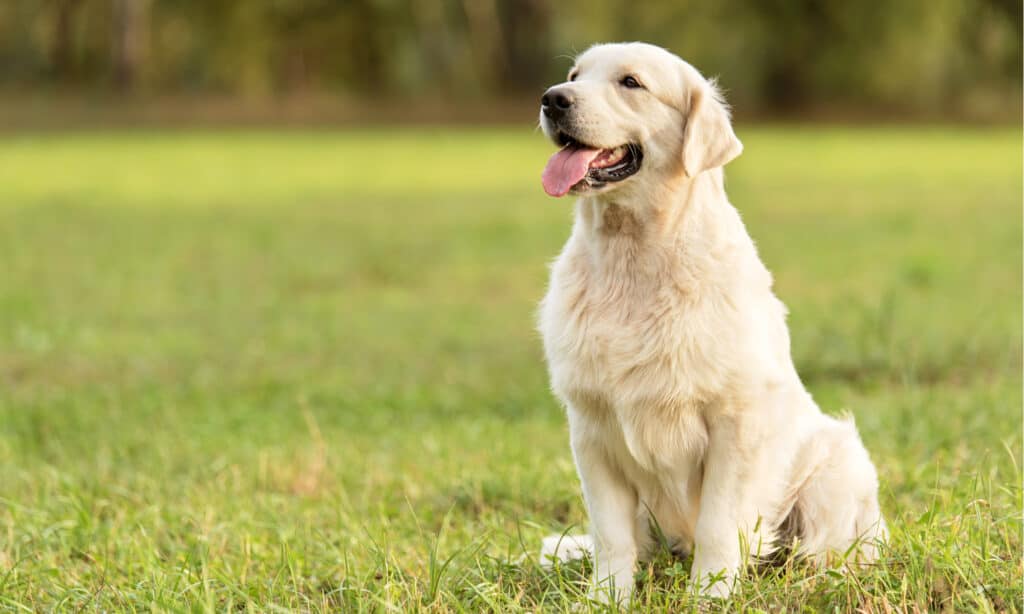
A golden retriever will have grown significantly around six to eight months of age.
©SasaStock/Shutterstock.com
Pictures Of the Golden Retriever as an Adult
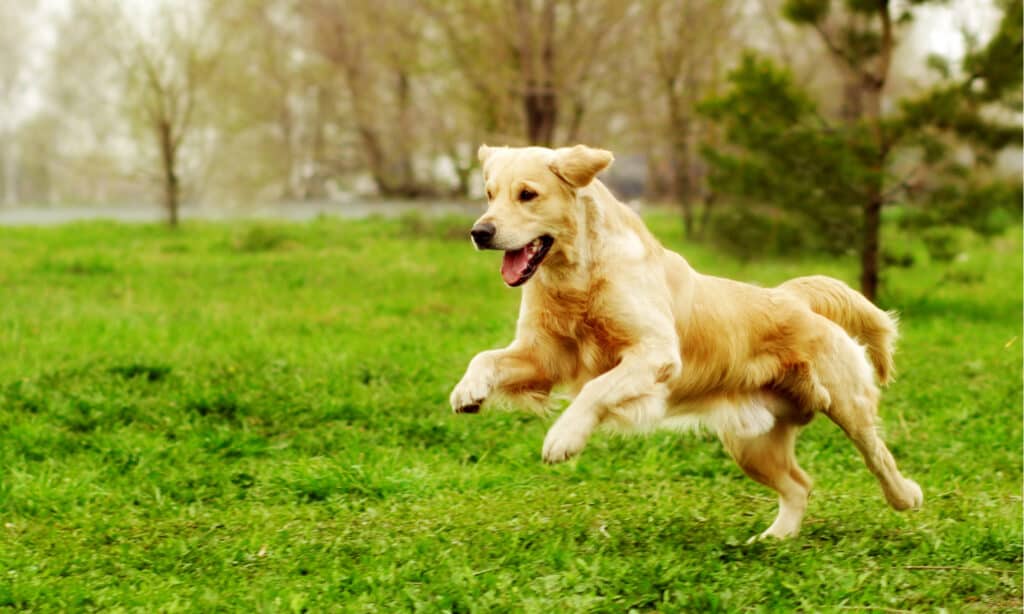
Golden retrievers enjoy the outdoors!
©Anna Goroshnikova/Shutterstock.com
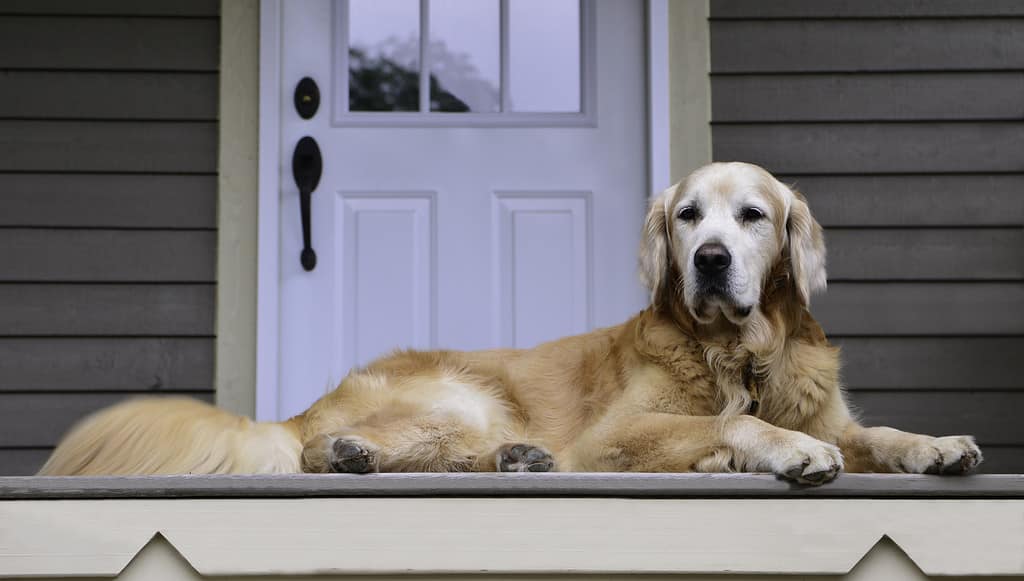
Even as seniors, golden retrievers make excellent companions.
©iStock.com/LucBrousseau
Are you ready to adopt a lovable golden retriever?
What Does a Golden Retriever Cost?

The initial cost of a golden retriever puppy will range from $1,000-$5,000, but typically up to $3,000. Adopting one will cost less. On the low end, you can expect to pay at least $900 a year for your Golden. This is if you don’t pay for pet insurance, only need routine vet care, and your food costs skew toward the low end. It also doesn’t include toys, treats, or any replacement items you may need to buy. Puppies and seniors tend to be the most expensive due to veterinary costs, while lower yearly costs are typical during your dog’s young adult years. Goldens live 10-12 years on average, which means you should expect to spend over $10,000 throughout your dog’s lifetime.
The photo featured at the top of this post is © Lunja/Shutterstock.com
Ready to discover the top 10 cutest dog breeds in the entire world?
How about the fastest dogs, the largest dogs and those that are -- quite frankly -- just the kindest dogs on the planet? Each day, AZ Animals sends out lists just like this to our thousands of email subscribers. And the best part? It's FREE. Join today by entering your email below.
Thank you for reading! Have some feedback for us? Contact the AZ Animals editorial team.






